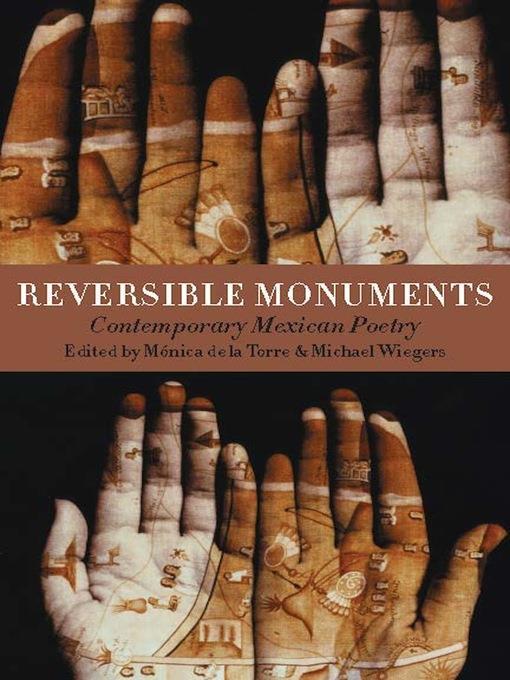
Reversible Monuments
Contemporary Mexican Poetry
- اطلاعات
- نقد و بررسی
- دیدگاه کاربران
نقد و بررسی

June 1, 2002
"Every now and then a word/ crosses the border... marrying another/ it is received hospitably,/ declining or serving as a shield:/ little by little words turn mestiza... The dark hued family of words/ produces a blond daughter." These lines from Antonio Deltoro's "Cartography" are among the offerings of Reversible Monuments: An Anthology of Contemporary Mexican Poetry. Edited by poet and translator M"nica de la Torre (coauthor of Appendices, Illustrations, & Notes) and Copper Canyon Press managing editor Michael Wiegers, this huge bilingual volume introduces readers to both lyric and narrative Mexican poets of varying backgrounds including indigenous poets writing in Zapotec and Mazatec all born after 1950.

Starred review from June 1, 2002
In Mexico, poets are so highly esteemed that they are considered their country's cultural ambassadors. Many write for daily newspapers, and most are consulted for opinions about politics and social issues. In the United States, on the contrary, poets usually earn their livings as teachers and, "quarantined with [their] writing students," spin their creative wheels by writing to and for academia rather than to society as a whole. Ironically, anthologies of contemporary American poetry frequently on bestsellers lists in Mexico go, like the words of prophets, ignored in their own country. If homegrown poetry ranks low on the list of American pastimes, translations of Mexican poetry could rank even lower. De la Torre, a translator and coordinator of literature and visual arts programming at the Mexican Cultural Institute of New York, and Wiegers, the managing editor at Copper Canyon, hope to change all that. This volume began as an exchange of poets between the United States and Mexico in 1998, sponsored by the Mexican Cultural Institute of New York and the Academy of American Poets. Featuring over 30 contemporary poets (born after or just before 1950), this anthology is a fresh voice from the south of the border. The language and extended metaphors found in many of these poems are original enough to suggest one of Mexico's finest poets, Sor Juana In s de la Cruz, or Spain's equally complex Baroque poet Luis de Gongora. Nevertheless, each poet's work is unique, and the syntax of the poetry is unmistakably modern. Many poets are award winners or recipients of Guggenheim fellowships. The bilingual layout is easy to follow; English translations match the original Spanish nearly stanza for stanza. An added feature is the section containing brief biographies of the translators. Recommended for poetry and Spanish-language collections in academic and public libraries. Nedra C. Evers, Sacramento P.L., CA
Copyright 2002 Library Journal, LLC Used with permission.

June 1, 2002
American readers haven't seen a collection of contemporary Mexican poetry since Mark Strand edited " New Poetry of Mexico" in 1970, observes Eliot Weinberger, distinguished scholar and translator of Octavio Paz, in his grounding introduction to this unique and substantial bilingual anthology. Since then, an entire "post-Paz generation" of poets has emerged, including the 31 gifted men and women showcased here, most writing in Spanish but some in indigenous languages. Spacious and accommodating, this work presents a generous number of gracefully translated poems by each poet, a felicitous in-depth approach that makes this much more than a sampler, and a sound decision given the poets' propensity for long, dreamy poems. Sensuality is ever-present, as is an intimate connection with nature, both classically pure and, in Efrain Bartolome's poems, under assault. Gods of diverse cultures put in surprising appearances, and many works are metaphysical, although more personal realms are illuminated by Gloria Gervitz and Pedro Serrano, and Josue Ramirez discerns the cosmic on Mexico City streets. This is without doubt a landmark volume, but let's hope that it doesn't stand alone for too long.(Reprinted with permission of Booklist, copyright 2002, American Library Association.)




دیدگاه کاربران